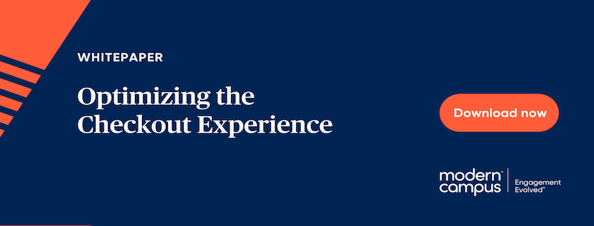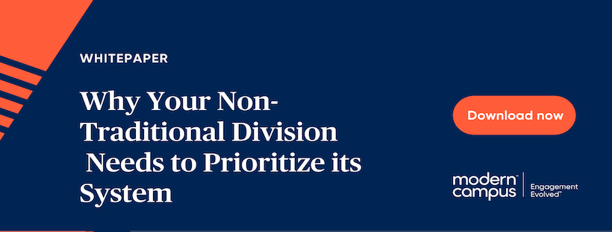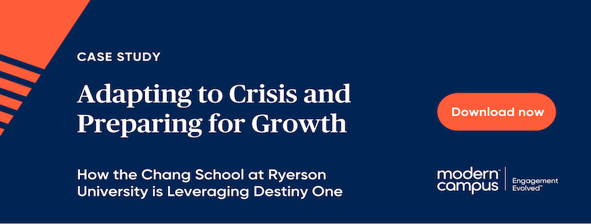Published on
Leveraging Technology to Achieve Growth in a Period of Decline

At Ryerson University’s Chang School for Continuing Education, innovation and customer service are at the heart of their work. With a mission to deliver relevant and market-responsive programming to non-traditional learners, it’s essential for the division to be flexible, fast-moving and focused on the learner experience.
To help execute on this vision, the Chang School adopted the Destiny One® student lifecycle management system in 2019. Not only did the system contribute to immediate enrollment growth and conversion, it also served as the centerpiece for the division’s response to the COVID-19 pandemic that hit months after implementation.
In this interview, Gary Hepburn, Fred Anger and Serena Wong reflect on the impact technology can have on the work of a division and share their insights into how the software supported their crisis response and their positioning for future growth.
The EvoLLLution (Evo): What are the characteristics of a great student and customer experience for non-traditional learners?
Gary Hepburn (GH): Non-traditional learners’ primary experience is the world outside. They’ve visited Amazon-like websites and have experience online shopping, so they’re accustomed to a smooth user experience.
What’s more, non-traditional students are often uncomfortable coming to a university, whether they’re coming back or enrolling for the first time. In order to make the university accessible, it’s important to give non-traditional students an environment where they feel comfortable, that they can navigate themselves and where they understand what we’re asking them to do.
Not all systems designed for traditional learners offer that experience, so adopting Destiny One has really helped us out.
Fred Anger (FA): A great student and customer experience makes things simple and straightforward. Importantly, a great customer experience relies on us not making people wait too long. Speed of service is the key today. As customers, we’re all used to eCommerce. Even in the higher education environment, eCommerce is the only option. We have to make the experience fast and efficient for our customers.
Through our implementation of Destiny One, we’ve reduced—and in many cases eliminated—wait times. The key part of our business case to engage with Destiny was to create a new website and to help students enroll faster.
Before we brought in Destiny One, students sometimes had to wait two or three days to register. We analyzed this process and found that we were losing a significant number of enrollments because of the wait time for learners. Creating a faster registration process was a key success factor for the whole project.
Serena Wong (SW): Before adopting Destiny One, our students were very frustrated with our old website. We had a lot of repetitive information, and things that were out of date. We solved the issue in two ways. First, we adopted the Destiny One system. Second, we did a massive revamp of our content, where we streamlined information and thought about everything from the student perspective. We looked at things from a student’s point of view, and made sure we were using terminology and framing search terms that students would understand.
Beyond that, it was very important to us that our new website was accessible (AODA-compliant) and mobile-friendly (responsive). With Destiny One, people can checkout with their phones and explore the website on their mobile device—which is expected today. Those are things that are really important to us.
Destiny One also delivers a more modern checkout experience similar to what customers are used to from popular eCommerce websites. Historically, one of the groups that struggled most with our original enrollment process was our seniors enrolling in our 50+ program offerings. When we were piloting Destiny One, we had one senior come in and try enrolling for a course using our new system to test its effectiveness before it went live. They were so surprised by how quick and easy it was to register with Destiny One. In fact, our takeaway from that experience was updating the message on the final screen, after the payment is processed, to gives students a clear indication that they’re done because they were so shocked by how quick it was.
In the past, we’ve had experiences of staff spending hours with prospective students helping to walk them through the registration process. We had one staff member who spent three hours with one individual senior helping them enroll using our old website. When I contrast that against how easily they enrolled through Destiny One, it provides a really great example of how we used this system to make the student experience better.
Evo: What are some of the positive differentiators that you’re now able to focus on as a result of meeting some of these expectations of a modern consumer?
FA: Destiny One has enabled us to execute innovative marketing strategies with a good website. Our old website wasn’t efficient, and our enrollment process was very bad. Even though our marketing was driving people to our site, the conversion rates weren’t there and we were losing a lot of potential students. With the adoption of Destiny One and the enhancements we’ve made, we’re really starting to see our marketing conversion rates go way up. It’s made our whole operation more efficient, and we’re seeing results. In the past, we were doing lots of activities, but we weren’t seeing the results.
GH: 60% of our summer session went away with the decision to close the campus to help mitigate the spread of COVID-19. We had to become a different unit almost overnight. Part of that meant that we had to be able to change our marketing and our website to reflect the fact that we’re going completely online. There were many things that had to happen to transition to a COVID-mitigation strategy, and one of those tasks was updating the website to reflect our new marketing campaign and highlight certain offers and information for learners.
We found Destiny One wonderful to work with and it helped us do what we needed it to do to react to COVID-19. It was a huge asset when we really needed it to be.
One amazing outcome Destiny One has assisted us with is that we’ve surpassed our total enrollment in spring and summer session that we had last year with only online courses. Despite losing 60% of our business a little over a month ago because of COVID-19, we’ve gained it all back. In fact, we think we’re going to exceed our business from last year.
Evo: What were some of the core factors that led to you adopting Destiny One?
FA: We had a very old home-grown system and website that needed to be retired.
We knew Destiny One was virtually number one in the continuing ed space. When we got to the RFP stage, we had many bidders who we interviewed and thoroughly looked at, but at the end of the day nothing could compete with the Destiny One product. Not only does it deliver the Amazon experience and seamlessness we were looking for, but it has a range of different modules and integrations with products like Tableau and Salesforce. These are all things that make the product stand out.
SW: From the IT perspective, we also considered a few different items during the RFP process. Beyond cost, comparative experience, market share, and initial implementation considerations, we were also mindful of security, privacy and ongoing system maintainability. We needed a provider with a history of delivering continuously good service and results after the purchase—not just while pitching for the RFP.
I’ve been through enough projects to know how key that is. There are some vendors who come in and present well, but once the product is implemented you run into security issues, stability issues, and all kinds of other problems that aren’t addressed in a timely manner. It was really important to us to work with a partner who has a history working with other higher ed clients. In this space, it’s essential to have a partner with relevant experience, who understands that you’re running an enterprise-grade eCommerce software.
Evo: How does software tailor-made for the non-traditional space help the Chang School deliver its mission?
FA: One thing we wanted to create was a mobile-friendly website. With Destiny One, our website is mobile-friendly, and this has a huge impact because everybody’s using their phones and tablets to shop and enroll. The fact that we’re mobile-friendly with Destiny One has been a huge leap forward for us.
GH: We need to be a unit that can pivot and respond very quickly to different situations. The Destiny One product has been a huge help in accomplishing this vision.
To support our university and to serve our students, we have to be nimble and agile. We’ve really had to embody that in response to the coronavirus pandemic and Destiny One went right along with us. We encountered minimal problems as we shifted things rapidly. I can’t imagine how we would have done it with our old website—it would have been a real difficulty. Destiny One is right there with us, even as our mission and work evolve into new things.
Evo: What has been the revenue growth and enrollment growth since implementation?
FA: Our continuing education student enrollment had been on a steep decline for almost two years. But right after we implemented Destiny One, we achieved a big increase in enrollments, both online and in-classroom. That wouldn’t have happened if we hadn’t implemented Destiny One. Ultimately, that’s why we did the project: the core mission of the Chang School is to serve our continuing education students.
To respond to the COVID-19 pandemic, in mid-March we moved our entire staff offsite and realized our spring-summer term would have to be totally virtual. At that time, we had over 10,000 classroom enrollments and about 8,000 online enrollments. The first part of our response to the pandemic was to leverage our existing large inventory of online courses as well as to virtualize about 135 of classroom courses for the spring-summer term.
In the last month we’ve basically gone from a situation where we didn’t think we’d be able to touch our 2019 spring-summer enrollment numbers to a point where we’re definitely going to exceed those numbers. It’s partly the fact that we have Destiny One in place, and partly the fact that we’ve really made a sustainable effort over the last many years to grow our roster of online courses.
Evo: As you’ve adapted to the challenges of COVID-19, where have you used the product to make sure that you’re delivering on your mission and delivering a remote learning and working environment, at a time when everyone is at home?
FA: The flexibility of Destiny One made it easy for us to go in and change our messages to students pretty quickly. We executed a completely new marketing campaign and updated our website rapidly, and it looks fantastic. In the old website, we wouldn’t have been able to do that as quickly. Now we can pivot quickly when needed.
GH: Destiny One is a strategic tool for us, and Destiny Solutions is a strategic partner for us. We’re really delighted with the partnership, especially these days because we’ve really been challenged. The website and the partnership have been huge assets to help us adapt.
SW: Our Destiny account manager knows our implementation and our integrations intimately, and being able to rely on the Destiny Solutions team to work with our internal IT teams is so important to enabling us to respond quickly and effectively as things change. Our IT staff at Ryerson are able to jump on calls with our Destiny support team and have very technically complex discussions to come to workable solutions to our business needs.
It was so important that, even beyond the product, to have knowledgeable Destiny Solutions staff to support us as well.
Evo: From the institutional level, what are a few of the university’s strategic goals for the next five years and how is the Chang School expected to play a role in the execution and realization of those goals?
GH: One thing the university is emphasizing is its desire for the Chang School to expand its online presence. This was a goal prior to the COVID-19 situation, and the pandemic provided us a stress test to see if we could pull off rapid expansion in this area. Not only have we successfully survived the test, we’ve done it quite well!
We’re well-positioned to really come out of this and transfer many of our courses and certificates online. This means we won’t just be serving our traditional, geographic markets. Instead, we’re preparing to have more of a national and international presence. The Destiny One system is a key piece of this; it helped us respond to this crisis and it’s a key part of our planning for the future.
SW: Destiny One will support the work related to scaling our business. For example, making sure we continue to be secure, that we continue to follow all the accessibility standards and keep information up to date. The factors needed to maintain compliance and security can change on a daily basis so this is not a trivial exercise—especially with the cyberattacks universities come under. The pieces related to keeping our business up-to-date and staying relevant to students’ expectations are essential. With its roster of clients across the higher education space, Destiny Solutions is in a unique position to see what’s coming and understand what other universities are asking for and building those into the system.
GH: As go forward, we view Destiny One as an asset. This is a robust system that’s going to be able to move with us and support our growth into the future. As we scale education, we have many things to worry about, but our system isn’t one. We’re very confident in it and very pleased that it was implemented before we were stress-tested by the coronavirus pandemic. I don’t know what we would’ve done without it.
FA: When you look at the trend in higher ed, obviously the growth of non-traditional learners is continuing unabated. A product like Destiny One is a big help to a school like Ryerson because Ryerson has a lot of non-traditional learners. We have a student population that’s very mobile, in a big city where people are busy. Destiny One enables us to serve our students in a very flexible way, which is the wave of the future.
This interview has been edited for length and clarity.
Author Perspective: Administrator






